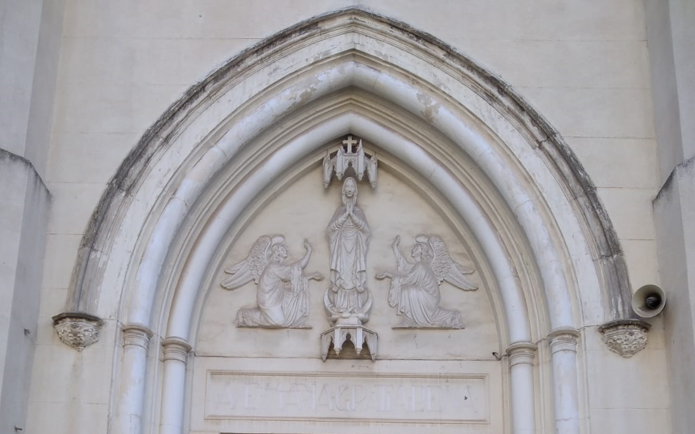The church of Benalúa in Alicante (Spain) and the religious architecture of Juan Vidal Ramos
DOI:
https://doi.org/10.18861/ania.2022.12.1.3214Keywords:
Alicante, Benalúa, Vidal Ramos, neogótico, arquitectura, escultura, reconstrucción, franquismo, posguerra española, iglesiasAbstract
The reconstruction project of the church of Benalúa is analyzed from the documentation kept in the General Archive of the State Administration of the Spanish Government, referring to the General Directorate of Devastated Regions of the Franco regime during the postwar period, completed with the information from from other bibliographical sources and from the model preserved on the church. In the work, the motivations on the choice of the neo-Gothic style in the projection of the work and its extension to other buildings erected by the author are raised. On the other hand, the incompleteness of the temple is also treated with respect to how it had been designed. In the same way, news is given of other religious buildings in the province of Alicante rebuilt by Vidal Ramos under the auspices of the aforementioned organization in the 1940s.
The most outstanding conclusions refer to the strong Gothic influence in the Catalan training of the architect and the precarious arrival of state funds for the reconstructions, which forced the modification of the projects and the omission of certain planned elements.
Downloads
References
Alcoy i Pedrós, Rosa (1984). La arquitectura religiosa de Joan Martorell y el eclecticismo fin de siglo. D'art (1984), 221-239.
Alonso Vera, Mª Dolores (1986). Juan Vidal Ramos, 1888-1975. Valencia: Colegio Oficial de Arquitectos de la Comunidad Valenciana.
Alonso Vera, Mª Dolores (2014). Juan Vidal Ramos, arquitecto. Canelobre, nº63 (2014), 257, 281.
Cabrera García, Mª Isabel (2010). El pasado como condición. Discurso artístico e identidad nacional durante el primer franquismo. En García Cuetos, M.P.; Almarcha Núñez-Herrador, M.E. y Hernández Martínez, A. (coordinadoras) (2010).
Restaurando la memoria. España e Italia ante la restauración monumental de posguerra. Gijón: Trea, 41-64.
Cortés Sempere, María del Carmen (2016). Las clarisas Capuchinas en Alicante de Época Moderna: Clausura y sociedad. Alicante: Universidad de Alicante (Tesis Doctoral). file:///C:/Users/gianl/Downloads/tesis_cortes_sempere%20(3).pdf
[cons. 3.1.2022].
Domingo Gresa, Jorge (2012). El dibujo de arquitectura en la formación de la ciudad de Alicante: fondo documental del archivo municipal (1691-1860). Valencia: Universidad de Valencia (Tesis Doctoral), t. 1,
Jaén i Urbán, Gaspar et alii (1999). Guía de arquitectura de la provincia de Alicante. Alicante: Instituto de Cultura Juan Gil Albert.
Larrinaga Cuadra, Andere (2006). La Exposición Internacional de Arte Sacro de Vitoria de 1939: un hito artístico en la postguerra española. Ondare, (2006) nº 25, 221-232.
Martínez Prades, José Antonio (2017). La impronta de El Escorial en la arquitectura española de la posguerra: algunos casos de reconstrucciones religiosas en la provincia de Alicante (España). Estoa, Revista de la Facultad de Arquitectura y Urbanismo de la Universidad de Cuenca (Ecuador) (2017), Vo. 6, nº10, 51-59. file:///C:/Users/gianl/Downloads/Dialnet-LaImprontaDeElEscorialEnLaArquitecturaEspanolaDeLa-6117297%20(2).pdf
[cons. 3.1.2022].
Martínez Prades, José Antonio (2020). Antonio Serrano Peral y la construcción de la Iglesia de Nuestra Señora de Gracia en Alicante. Contexto, Revista de la Facultad de Arquitectura de la Universidad Autónoma de Nuevo León (Méjico) (2020), Vol. 14, nº. 21, 15-24. file:///C:/Users/gianl/Downloads/Dialnet-AntonioSerranoPeralYLaConstruccionDeLaIglesiaDeNue-7688934%20(2).pdf [cons. 3.1.2022].
Martínez Medina, Andrés (1988). La arquitectura de la ciudad de Alicante, 1923-1943: la aventura de la modernidad. Alicante: Colegio Territorial de Arquitectos de Alicante.
Moreno Seco, Mónica (1999). La Diócesis de Orihuela-Alicante en el franquismo: 1939-1975. (Tesis Doctoral, Universidad de Alicante). Salamanca: TESITEX. https://rua.ua.es/dspace/bitstream/10045/9890/2/Moreno-Seco-Monica_1.pdf [cons.25.12.2021].
Navascués Palacio, P. (2015). Los autores: arquitectos, pintores y dibujantes. Madrid: Real Academia de Bellas Arte de San Fernando.
Pérez del Hoyo, Raquel et alii (2012). El cuerpo material gráfico, patrimonio y memoria: la maqueta de la iglesia de San Juan Bautista de Alicante. Actas del XI Congreso internacional de expresión gráfica aplicada a la edificación. Valencia: APEGA, 282-392.
R.A.B.S.A.F. (2021). Relación General de Académicos (1752-2020). Madrid: Real Academia de Bellas Artes de San Fernando.
Rodríguez Ramírez, F. J. y Hernàndez Ventura, S. (2008). Església i convént de les Saleses. Barcelona: Universitat Politècnica de Catalunya.
Sala Seva, Federico (1983). Estampas Benaluenses: un Templo con historia. Alicante: Imprenta Gráficas Díaz.
Varela Botella, Santiago (2001). Obra de los arquitectos en Alicante. Alicante: Instituto de Cultura Juan Gil Albert.
Archivo General de la Administración del Estado (AGA). Alcalá de Henares (España). Fondo de la Dirección General de Regiones Devastadas. Junta Nacional de Reconstrucción de Templos Parroquiales (JNRTP). Parroquial de Monóvar (1940). Referencia (04) 81.1, TOP 76/04-12, Caja 3399.
AGA (JNRTP) Santiago de Villena (1943). Referencia (04) 81.1, TOP 76/04-12, Caja 3902.
AGA (JNRTP). Parroquia de Benalúa de Alicante (1945). Referencia (04) 81.1, TOP 76/04-12, Caja 3501.
AGA (JNRTP). Capilla del Castillo de Guadalest (1954). Referencia (04) 81.1, TOP 76/04-12, Caja 3500.
AGA (JNRTP). Cuentas de la Diócesis de Orihuela. Obras Públicas. Referencia 26/16208. San Juan Bautista de Alicante.

Published
How to Cite
Issue
Section
License
Copyright (c) 2021 José Antonio Martínez Prades

This work is licensed under a Creative Commons Attribution 4.0 International License.
The journal and its contents are licensed under the Creative Commons - Attribution 4.0 International License (CC BY 4.0). It is possible to copy, communicate and publicly distribute its content as long as the individual authors and the name of this publication are cited, as well as the publishing institution (Universidad ORT Uruguay).

